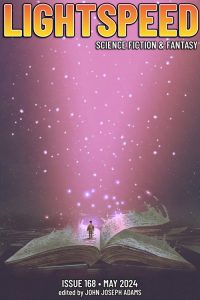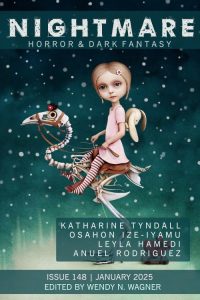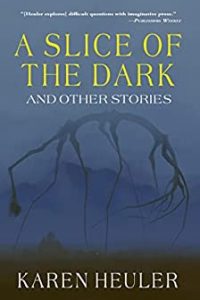Charles Payseur Reviews Short Fiction: Cast of Wonders, Escape Pod, Strange Horizons, and Lightspeed
 Cast of Wonders 4/13/24, 5/5/24
Cast of Wonders 4/13/24, 5/5/24
Escape Pod 4/25/24
Strange Horizons 4/29/24, 5/16/24
Lightspeed 5/24
Cast of Wonders’ April included Plangdi Neple’s “Bodies of Sand and Blood”, which follows a young trans boy trying to learn the magic of the men of his people, but who again and again is told he cannot because of his body. And yet at his lowest, he hears voices in the darkness that simultaneously acknowledge his true self and hints that a solution to his problems is not as impossible as it seems. Neple captures well a feeling of yearning and need against the societal and familial pressures to conform and obey, and casts that against cultural lessons and stories that prize innovation, change, and freedom. The narrator has to follow his heart, and inso doing continue the traditions of claiming and shaping power and magic long denied to humans, which places him on the same level as the great religious and historical figures of his people, though those in power around him don’t seem to appreciate that. Moving into May, Grace Griego’s “Robot Girl” looks at the pressures and pitfalls of being “perfect” as the narrator moves through childhood and adolescence as a robot, excelling when given clear direction and goals. When adulthood looms, though, and college takes away many of the familiar goalposts and structures she had used to succeed, she is suddenly faced with a system where she’s no longer “perfect,” and it kind of breaks her. Griego digs into the realities of a neurodiverse narrator whose coping mechanisms have failed, leading to intense burnout that manifests like a broken machine, where inputs and outputs no longer reliably make sense. And the story explores how for Robot Girl, it’s only when she drops the pretense of unfeeling automation and allows herself to be vulnerable that she can start to get the help she needs. It’s a powerful and moving read.
Escape Pod closed out April with Tim Chawaga’s strange “Chug the Tea Leaves, Chuck the Ads”, in which the narrator wakes up to suddenly getting very bizarre ads on their MindzEye, a ubiquitous algorithm technology that’s so good it seems to predict the future. Getting ads for life insurance might portend a major medical catastrophe, or ads for vacations might mean a promotion is forthcoming. But for the narrator, the ads are nightmarish, unsettling, and not even professional ad gurus can tell him what they mean. Chawaga does a great job of building up this technology and then playing with it, twisting expectations as the narrator is faced with the increasingly alarming ads and has to decide what it might or might not mean. And the story sidesteps casting the technology as evil or malevolent, instead finding a creative way of showing it at work in some subtle and smart ways.
Strange Horizons kept true to its name with the very strange “Nuca” by Ana Hurtado in April, which finds three friends (Anahí, who is in a relationship with Carme, but who is also the object of Dolores’s very big crush) trying to cure a recent ailment – the emergence of second faces that have grown on the backs of their heads. As the three women road trip to various spots that promise healing waters, an aching portrait of longing and love develops that hints that their malady might be the manifestation of the things they do not tell each other. Especially for Dolores, in desperate love with Anahí but unwilling to voice her feelings, the trip and proximity to her friends only seems to make her other face more powerful, and Hurtado does a beautiful job of following the journey and the messy emotional rollercoaster it traces. Strange Horizons closed out April with a neurodivergent special issue, which includes the poem “Now You Know” by Arthur H. Manners. The piece features a central relationship between the narrator and someone else – a partner, perhaps, or a sibling or parent who berates the narrator to be more manly, more self-sufficient. Until they cooperate on a job that links them mentally and when the narrator’s disability leaks into their mind, causing them distress and anger. More so because it requires them to reckon with how “real” the disability is, when they’ve always denied acknowledging it actually exists. Not that it’s a huge comfort to either, and I love how Manners show how that recognition is neither enthusiastically given nor alleviates the pains they are both now experiencing. Moving into May, Varsha Dinesh’s “Those Who Smuggle Themselves Into Silvermoon” follows Saki, a darkworlder who manages to smuggle themselves into Silvermoon, where the wealthy live. But in getting there they needed to lose their body so they can work as a ghost, saving up points for the chance of pulling body parts in a lottery system that seems rigged to keep the poor scrambling while those with power lord out of reach. But Saki has a plan – to save up and reunite with their lover Anjun, gaining bodies and building a life together out from poverty and danger. But in a place of such corruption, rising only seems to happen by stepping on the backs of other darkworlders, and Dinesh really digs into the vicious nature of the system, finding in Saki a romantic who believes hard work will be rewarded even as the grim realities of Silvermoon become cruelly apparent. It’s unsettling at times and heartbreaking, but captured with style and a sharp emotional edge, and it makes for an amazing read!
Caroline M. Yoachim returns to the pages of Lightspeed in May with the structurally complex “We Will Teach You How to Read | We Will Teach You How to Read”, which is presented as an alien race trying to communicate with humans. More than that, trying to teach someone, anyone, their way of communicating and telling stories, knowing that it will soon be gone, as generational churn will replace their method with something different and less layered. The communication itself builds around concurrence and repetition both, cycles that vary but that can also overlap, with readers meant to follow more than one thread at a time. And Yoachim does manage to relate a narrative through the form, full of longing and hope, in a way that feels both alien and understandable. It’s certainly an experimental piece that’s well worth spending some time with, practicing new ways of reading, understanding, and experiencing stories. Ben Peek explores a world just under our own full of supernatural threats and artifacts in “Exit Interview”, which focuses on Virginia Briggs, a mother whose daughter disappeared and who was recruited by a mysterious Ministry with vague promises that they can help her find the truth of what happened. Years later, though, she’s contacted by the man who recruited her with some information that had been help back from her from the beginning. The framing of the story, that of paperwork and transcripts of Briggs’s exit from the Ministry, sets a nice contrast between the mundane bureaucracy of the organization and both the supernatural world they deal with and the viciously corrupt means they use to further their interests. The result is moody and grim, and Peek resists the pull of despair to focus on the resilience and determination of Briggs to find the truth and respond accordingly.
Recommended Stories
“Bodies of Sand and Blood”, Plangdi Neple (Cast of Wonders 4/24)
“Chug the Tea Leaves, Chuck the Ads”, Tim Chawaga (Escape Pod 4/24)
“Those Who Smuggle Themselves Into Silvermoon”, Varsha Dinesh (Strange Horizons 5/24)
Charles Payseur is an avid reader, writer, and reviewer of speculative fiction. His works have appeared in The Best American Science Fiction and Fantasy, Lightspeed Magazine, and Beneath Ceaseless Skies, among others, and many are included in his debut collection, The Burning Day and Other Strange Stories (Lethe Press 2021). He is the series editor of We’re Here: The Best Queer Speculative Fiction (Neon Hemlock Press) and a multiple-time Hugo and Ignyte Award finalist for his work at Quick Sip Reviews. When not drunkenly discussing Goosebumps, X-Men comic books, and his cats on his Patreon (/quicksipreviews) and Twitter (@ClowderofTwo), he can probably found raising a beer with his husband, Matt, in their home in Eau Claire, Wisconsin.
This review and more like it in the July 2024 issue of Locus.
 While you are here, please take a moment to support Locus with a one-time or recurring donation. We rely on reader donations to keep the magazine and site going, and would like to keep the site paywall free, but WE NEED YOUR FINANCIAL SUPPORT to continue quality coverage of the science fiction and fantasy field.
While you are here, please take a moment to support Locus with a one-time or recurring donation. We rely on reader donations to keep the magazine and site going, and would like to keep the site paywall free, but WE NEED YOUR FINANCIAL SUPPORT to continue quality coverage of the science fiction and fantasy field.
©Locus Magazine. Copyrighted material may not be republished without permission of LSFF.






